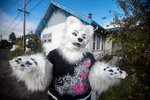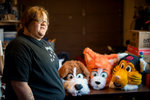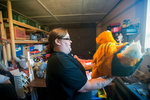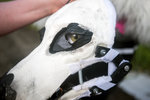





For some people, dressing like an animal is a way to break out of their shells and connect with others, explore their creativity and, sometimes, tap into a very lucrative business opportunity.
“I feel different when I put the suit on,” said fursuiter Amber Briggs. “I’m shy and keep to myself … I don’t get out of my bubble often, but in the suit I can really get out of it. It’s kind of a release.”
The Internet has made it possible for so-called furries near and far to connect, commune and buy costumes from one another. From its humble beginnings in the early 1980s, the furry community has grown to include people across the United States. Annual conventions such as Rainfurrest in Seattle attract thousands of animal suited people.
Furries, or, fursuiters, as their also called, are people who wear anthropomorphic animal costumes and take on a new persona as a sort of hobby. The suites range in style and detail from realistic foxes and cats, to dragons or plush mascot-looking figures. Most suits are a character have a predetermined personality acted out by the people wearing them.
A furry might own more than one suit, but typically he or she has one animal character in particular that describes who they are if they were an animal.
“For me, my character represents how I would see myself if I were an animal,” said local furry and fursuit builder Amanda Gray.
Gray is the curator of a local Facebook-based social group called Rainy Day Furries. The group has more than 90 members from the Chehalis and Centralia area. She and fellow fursuiter Briggs also make animal masks and full animal suits that they sell for anywhere between $300 and $1,800. Through various furry forums, Gray has several clients from around the country. She’s even made a partial suit for a customer in Australia.
While the community is friendly about their designs, they guard them seriously. Like most designers, they patent their suits. Gray requires a contract for every design, and each one she makes comes with a voidable warranty if the purchaser alters the suit.
“I got started through a bad experience. I paid someone online to make me one for super cheap,” Gray said. “Nothing came of it. It’s been about four or five years now and I just recently saw a refund.”
America is full of subcultures, fraternal orders, social clubs and geeks that the larger society loves to make fun of (Trekkies, for example) but perhaps none are more ridiculed than the furry community.
In TV shows such as “CSI,” “1,000 Ways to Die,” and MTV’s “Sex 2k,” the mass media has had a heyday portraying furries as eccentric weirdos who dress in animal suits to get their erotics kicks. Some local fursuiters say that while there is an small part of the population that fetishizes animal suits, it’s only a small segment of the community at large.
“A lot of people think furries are sexual deviants, thinking they put the suits on just so they can mess around in them,” said Gray. “Beastiality is another one we get nailed for … it makes us guilty by association.”
Sometimes people’s disapproval becomes downright dangerous. A Dec. 7 furry convention in Chicago had to be temporarily evacuated and 19 people were hospitalized due to a chlorine gas leak that police suggested was an intentional act.
Gray and Briggs say they try to have group meetups a couple times a month where they and their other friends can all hang out and wear or make their suits together. They say they always try to call in advance before they go hang out at a business.
“It’s basically common courtesy to be ‘like hey I’m with this group … by the way we like to put costumes on and look like animals,’” Gray said.
Both women said adults often give them strange looks about what they’re wearing but some, especially kids, enjoy it. For the furries themselves, it’s an exciting hobby.
“It’s not going to cure you being shy,” Gray said. “You wouldn’t go to Disney World with Mickey Mouse’s head on and hide in the corner.”